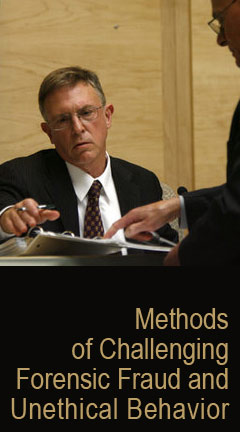Archival Notice
This is an archive page that is no longer being updated. It may contain outdated information and links may no longer function as originally intended.
Home | Glossary | Resources | Help | Course Map
Surveys have established that jurors rely heavily on forensic testimony in a high percentage of cases. In many cases, jurors report that forensic witnesses were very persuasive in the ultimate outcome of the case.
For the forensic witness to continue in this posture of pre-eminence in the legal process, it is essential for the witness's expert testimony to be able to withstand the challenges of rigorous cross-examination.
Effective cross-examination is often an objective technique to attack or impeach the testimony of a fraudulent or unethical forensic witness. Cross-examining attorneys can challenge forensic testimony based upon:
- Fraud.
- Unethical behavior.
- Incomplete or inadequate investigation.
- Lack of preparation.
- Inexperience.
Additional Online Courses
- What Every First Responding Officer Should Know About DNA Evidence
- Collecting DNA Evidence at Property Crime Scenes
- DNA – A Prosecutor’s Practice Notebook
- Crime Scene and DNA Basics
- Laboratory Safety Programs
- DNA Amplification
- Population Genetics and Statistics
- Non-STR DNA Markers: SNPs, Y-STRs, LCN and mtDNA
- Firearms Examiner Training
- Forensic DNA Education for Law Enforcement Decisionmakers
- What Every Investigator and Evidence Technician Should Know About DNA Evidence
- Principles of Forensic DNA for Officers of the Court
- Law 101: Legal Guide for the Forensic Expert
- Laboratory Orientation and Testing of Body Fluids and Tissues
- DNA Extraction and Quantitation
- STR Data Analysis and Interpretation
- Communication Skills, Report Writing, and Courtroom Testimony
- Español for Law Enforcement
- Amplified DNA Product Separation for Forensic Analysts


